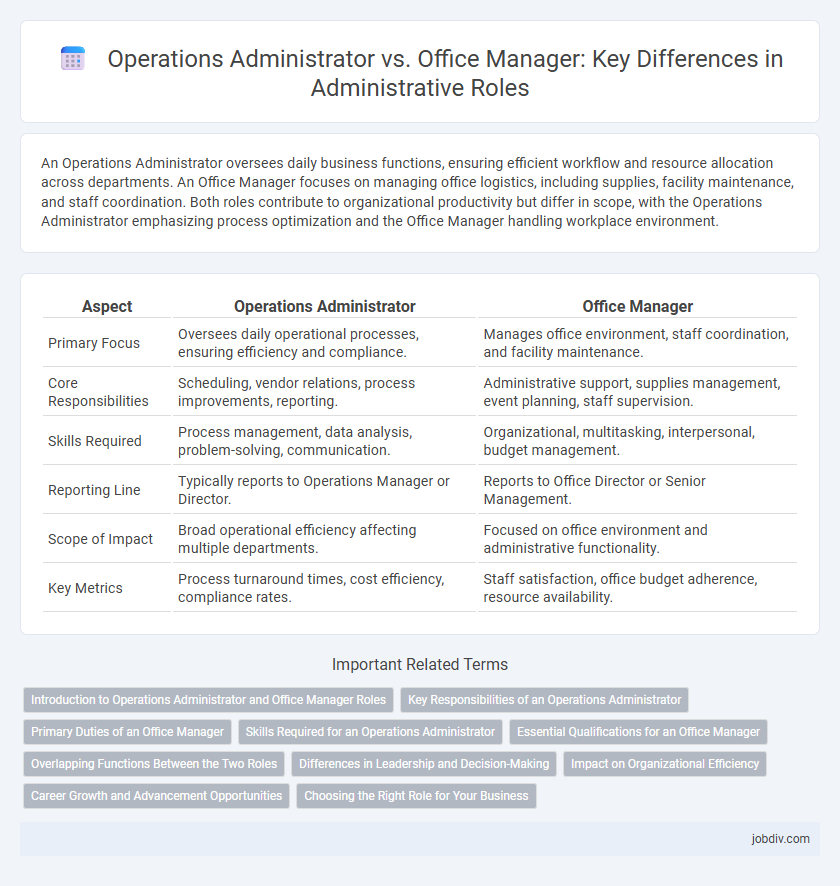An Operations Administrator oversees daily business functions, ensuring efficient workflow and resource allocation across departments. An Office Manager focuses on managing office logistics, including supplies, facility maintenance, and staff coordination. Both roles contribute to organizational productivity but differ in scope, with the Operations Administrator emphasizing process optimization and the Office Manager handling workplace environment.
Table of Comparison
| Aspect | Operations Administrator | Office Manager |
|---|---|---|
| Primary Focus | Oversees daily operational processes, ensuring efficiency and compliance. | Manages office environment, staff coordination, and facility maintenance. |
| Core Responsibilities | Scheduling, vendor relations, process improvements, reporting. | Administrative support, supplies management, event planning, staff supervision. |
| Skills Required | Process management, data analysis, problem-solving, communication. | Organizational, multitasking, interpersonal, budget management. |
| Reporting Line | Typically reports to Operations Manager or Director. | Reports to Office Director or Senior Management. |
| Scope of Impact | Broad operational efficiency affecting multiple departments. | Focused on office environment and administrative functionality. |
| Key Metrics | Process turnaround times, cost efficiency, compliance rates. | Staff satisfaction, office budget adherence, resource availability. |
Introduction to Operations Administrator and Office Manager Roles
Operations Administrators coordinate daily business activities, focusing on streamlining processes, managing resources, and ensuring operational efficiency across departments. Office Managers oversee administrative functions, including facility management, staff supervision, and maintaining organizational systems to support office productivity. Both roles contribute to effective administration but differ in scope, with Operations Administrators emphasizing operational workflows and Office Managers concentrating on office environment management.
Key Responsibilities of an Operations Administrator
Operations Administrators oversee daily business functions, ensuring efficient workflow and resource allocation across departments. They manage scheduling, compliance, vendor relationships, and internal communications to optimize operational performance. Proficiency in project management and data analysis supports their role in streamlining processes and improving organizational productivity.
Primary Duties of an Office Manager
An Office Manager oversees daily administrative operations, ensuring workflow efficiency, managing office supplies, and coordinating communication across departments. They supervise staff schedules, organize meetings, and implement office policies to maintain a productive work environment. Office Managers also handle budgeting, vendor relationships, and facility management to support overall organizational effectiveness.
Skills Required for an Operations Administrator
Operations Administrators require strong organizational skills, proficiency in project management software, and the ability to analyze and improve operational workflows. They must excel in communication, data analysis, and problem-solving to ensure efficient process execution and resource allocation. Expertise in compliance standards and multitasking across departments distinguishes their skill set from that of an Office Manager.
Essential Qualifications for an Office Manager
Essential qualifications for an Office Manager include strong organizational skills, proficiency in office software such as Microsoft Office Suite and project management tools, and excellent communication abilities. Experience in managing administrative tasks, coordinating team activities, and overseeing office operations is critical to ensure smooth workflow and efficiency. Leadership qualities, problem-solving skills, and knowledge of budgeting and resource allocation further enhance an Office Manager's effectiveness compared to an Operations Administrator.
Overlapping Functions Between the Two Roles
Operations Administrators and Office Managers both oversee daily administrative tasks, ensuring smooth workflow and efficient resource allocation within an organization. They manage scheduling, coordinate communication between departments, and handle office supplies inventory, contributing to operational consistency. Both roles require strong organizational skills and a focus on optimizing internal processes to support business objectives.
Differences in Leadership and Decision-Making
Operations Administrators primarily focus on optimizing internal processes and workflow efficiencies, leading teams with a detail-oriented approach to ensure smooth operational execution. Office Managers oversee broader office functionality, managing administrative staff and handling diverse responsibilities, requiring adaptive leadership to address various day-to-day challenges. Decision-making for Operations Administrators is data-driven and tactical, while Office Managers often engage in strategic choices affecting workplace culture and employee relations.
Impact on Organizational Efficiency
Operations Administrators streamline core business processes by managing workflow systems and ensuring resource allocation aligns with operational goals, significantly boosting organizational efficiency. Office Managers focus on maintaining day-to-day administrative functions, optimizing office environment and employee productivity through effective facility management. Combined, their roles enhance overall organizational performance by balancing strategic operational oversight with smooth administrative execution.
Career Growth and Advancement Opportunities
Operations Administrators often have clearer pathways to career advancement within project management, process optimization, and strategic roles due to their focus on operational efficiency and data-driven decision-making. Office Managers, while essential for maintaining daily office functions and team coordination, may face more limited upward mobility unless they expand their skill set into HR, facilities management, or administrative leadership. Specializing in operational technology and process improvement tools can significantly enhance career growth prospects for Operations Administrators.
Choosing the Right Role for Your Business
Choosing between an Operations Administrator and an Office Manager depends on your business's primary needs: an Operations Administrator focuses on streamlining processes, managing project workflows, and maintaining operational efficiency, while an Office Manager oversees day-to-day office functions, staff coordination, and administrative support. Businesses seeking optimized operational performance benefit from hiring an Operations Administrator with skills in process improvement and data analysis. Companies prioritizing employee management and office environment typically prefer an Office Manager experienced in team leadership and facility management.
Operations Administrator vs Office Manager Infographic

 jobdiv.com
jobdiv.com